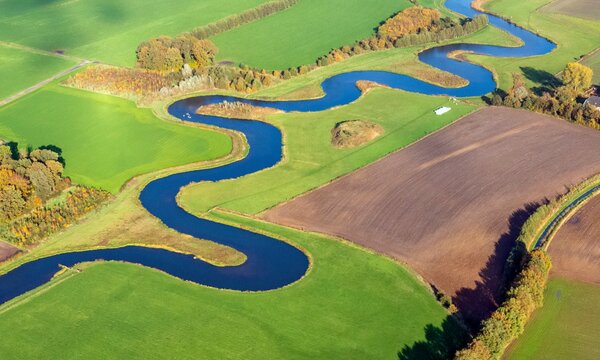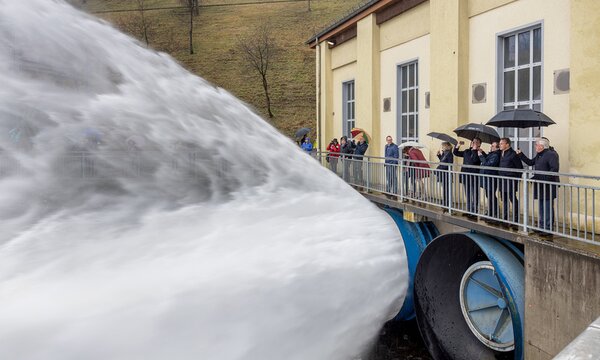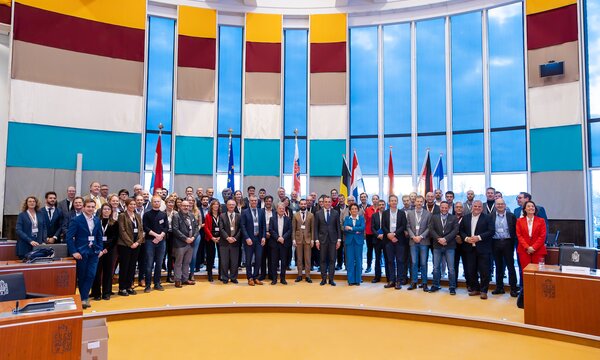We spoke to Rafaella Gouveia Loureiro Oliveira, a PhD researcher from VU Amsterdam, who is conducting her research ’Understanding adaptive behaviour in flood forecasting: balancing short-term responses and long-term protection for resilience’ within the scope of our program. In this interview, we discussed the potential impact of her work on improving community responses to flooding and the challenges that lie ahead in implementing effective and coordinated flood management strategies.
Welcome Rafaella, thank you for speaking to us about your work. Can you briefly describe the main topic of your PhD research?
My PhD research focuses on action-based flood forecasting. Specifically, I am aiming to understand how people respond to flood forecasts and warnings, and how that understanding can improve the design of more effective early warning systems. Additionally, I am exploring the trade-offs between short-term responses and long-term structural measures in the context of future climate scenarios.
What motivated you to pursue a PhD, particularly in this field of research?
I chose to pursue a PhD to develop the skills necessary for leading impactful research projects, especially those with practical applications. I specifically selected this field because flood risk management is a persistent challenge in Brazil, my home country, and increasingly important in many parts of the world. I want to contribute to the scientific community that is addressing these pressing issues.
Is your research focused on a specific geographic area?
Yes, I am concentrating on the Limburg region, which was severely impacted by the 2021 floods. More precisely, I am studying the Geul catchment, a transboundary river basin shared by the Netherlands, Belgium, and Germany.
What specific objectives are you hoping to achieve with your current research?
My primary objectives are to support the development of more effective flood forecasting and early warning systems, explore optimal integration with structural measures for resilient flood risk management, and provide insights that inform adaptive and sustainable policy design under climate change scenarios.
What opportunities and challenges do you foresee while conducting research in a transboundary context?
Research in a transboundary context presents opportunities for collaboration with multiple countries and institutions, encouraging knowledge exchange and innovation. However, it also poses challenges such as navigating different institutional structures and stakeholder priorities. Ensuring effective early warning systems across borders necessitates close cooperation and a shared understanding among diverse actors from each region.
How does your research fit within the partnerships between regional governments and academic institutions?
My research will benefit from active interaction with regional governments, especially in comprehending what information and support they require from flood forecasting systems. Simultaneously, it draws on the expertise of partner academic institutions that specialise in behavioural science and flood risk assessment, facilitating a knowledge exchange that enhances practical relevance.
In what ways do you anticipate your research impacting policymaking?
I hope my research contributes to evidence-based policies for flood risk management. Ideally, my findings will assist local and regional agencies in making informed decisions regarding emergency planning, public communication strategies, and long-term adaptation efforts amid climate change.
Given the various stakeholders involved in JCAR ATRACE, what interactions are you looking forward to?
I look forward to engaging with local stakeholders, including waterboards, emergency response agencies, and regional planners. These interactions are crucial for gaining insight into their current challenges, strategic priorities, and expectations from research like mine. I see these dialogues as essential for ensuring that my work is both relevant and actionable.
What long-term impacts do you envision your research having on regional climate strategies?
I aspire for my research to support long-term climate strategies by generating insights that guide the development of effective preparedness policies and warning strategies. Ideally, the findings will help decision-makers and land-use planners design flexible and adaptive flood risk management approaches consistent with evolving climate projections.
Are there any scientific or technological breakthroughs you hope to encounter during your PhD?
I aim to explore advances in agent-based modelling and data integration that could enhance our ability to simulate human behaviour in response to flood forecasts. I'm particularly interested in developing reliable, impact-based flood forecasting systems with enough spatial detail to facilitate timely and targeted early warning and preparedness actions.
Finally, what challenges do you anticipate facing as climate conditions continue to change?
As climate conditions evolve, I expect challenges related to the increasing unpredictability of extreme weather events, which could complicate our ability to create accurate forecasts and timely responses. Additionally, adapting existing infrastructure and policies to integrate new scientific findings will be crucial as we work towards more resilient flood risk management strategies.



